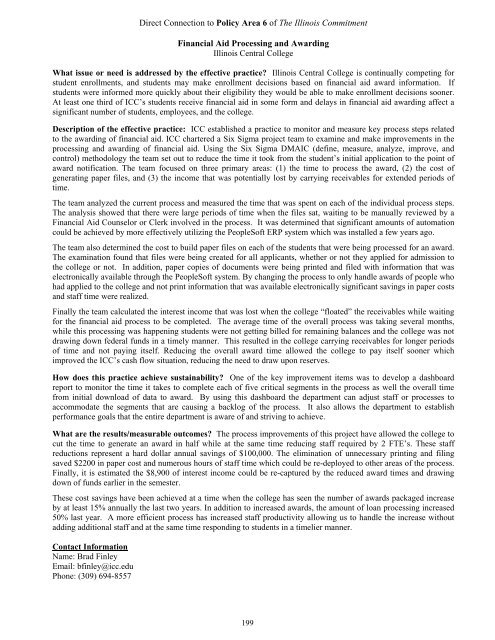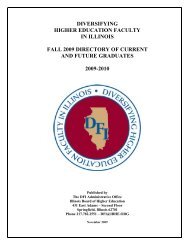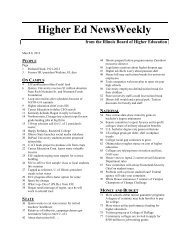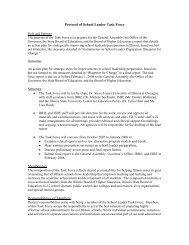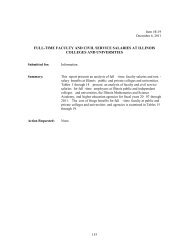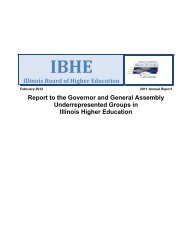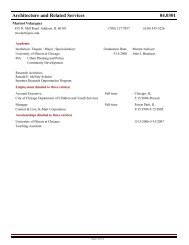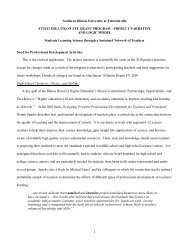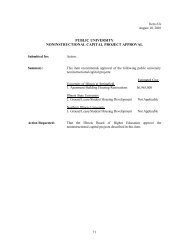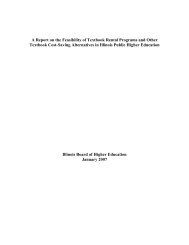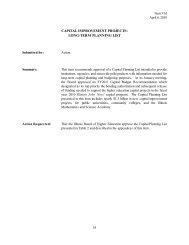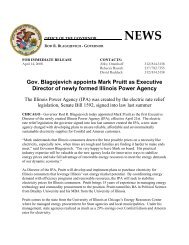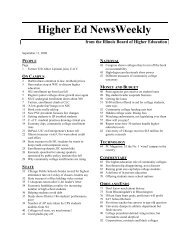Title of Effective Practice: - California Postsecondary Education ...
Title of Effective Practice: - California Postsecondary Education ...
Title of Effective Practice: - California Postsecondary Education ...
Create successful ePaper yourself
Turn your PDF publications into a flip-book with our unique Google optimized e-Paper software.
Direct Connection to Policy Area 6 <strong>of</strong> The Illinois Commitment<br />
Financial Aid Processing and Awarding<br />
Illinois Central College<br />
What issue or need is addressed by the effective practice? Illinois Central College is continually competing for<br />
student enrollments, and students may make enrollment decisions based on financial aid award information. If<br />
students were informed more quickly about their eligibility they would be able to make enrollment decisions sooner.<br />
At least one third <strong>of</strong> ICC’s students receive financial aid in some form and delays in financial aid awarding affect a<br />
significant number <strong>of</strong> students, employees, and the college.<br />
Description <strong>of</strong> the effective practice: ICC established a practice to monitor and measure key process steps related<br />
to the awarding <strong>of</strong> financial aid. ICC chartered a Six Sigma project team to examine and make improvements in the<br />
processing and awarding <strong>of</strong> financial aid. Using the Six Sigma DMAIC (define, measure, analyze, improve, and<br />
control) methodology the team set out to reduce the time it took from the student’s initial application to the point <strong>of</strong><br />
award notification. The team focused on three primary areas: (1) the time to process the award, (2) the cost <strong>of</strong><br />
generating paper files, and (3) the income that was potentially lost by carrying receivables for extended periods <strong>of</strong><br />
time.<br />
The team analyzed the current process and measured the time that was spent on each <strong>of</strong> the individual process steps.<br />
The analysis showed that there were large periods <strong>of</strong> time when the files sat, waiting to be manually reviewed by a<br />
Financial Aid Counselor or Clerk involved in the process. It was determined that significant amounts <strong>of</strong> automation<br />
could be achieved by more effectively utilizing the PeopleS<strong>of</strong>t ERP system which was installed a few years ago.<br />
The team also determined the cost to build paper files on each <strong>of</strong> the students that were being processed for an award.<br />
The examination found that files were being created for all applicants, whether or not they applied for admission to<br />
the college or not. In addition, paper copies <strong>of</strong> documents were being printed and filed with information that was<br />
electronically available through the PeopleS<strong>of</strong>t system. By changing the process to only handle awards <strong>of</strong> people who<br />
had applied to the college and not print information that was available electronically significant savings in paper costs<br />
and staff time were realized.<br />
Finally the team calculated the interest income that was lost when the college “floated” the receivables while waiting<br />
for the financial aid process to be completed. The average time <strong>of</strong> the overall process was taking several months,<br />
while this processing was happening students were not getting billed for remaining balances and the college was not<br />
drawing down federal funds in a timely manner. This resulted in the college carrying receivables for longer periods<br />
<strong>of</strong> time and not paying itself. Reducing the overall award time allowed the college to pay itself sooner which<br />
improved the ICC’s cash flow situation, reducing the need to draw upon reserves.<br />
How does this practice achieve sustainability? One <strong>of</strong> the key improvement items was to develop a dashboard<br />
report to monitor the time it takes to complete each <strong>of</strong> five critical segments in the process as well the overall time<br />
from initial download <strong>of</strong> data to award. By using this dashboard the department can adjust staff or processes to<br />
accommodate the segments that are causing a backlog <strong>of</strong> the process. It also allows the department to establish<br />
performance goals that the entire department is aware <strong>of</strong> and striving to achieve.<br />
What are the results/measurable outcomes? The process improvements <strong>of</strong> this project have allowed the college to<br />
cut the time to generate an award in half while at the same time reducing staff required by 2 FTE’s. These staff<br />
reductions represent a hard dollar annual savings <strong>of</strong> $100,000. The elimination <strong>of</strong> unnecessary printing and filing<br />
saved $2200 in paper cost and numerous hours <strong>of</strong> staff time which could be re-deployed to other areas <strong>of</strong> the process.<br />
Finally, it is estimated the $8,900 <strong>of</strong> interest income could be re-captured by the reduced award times and drawing<br />
down <strong>of</strong> funds earlier in the semester.<br />
These cost savings have been achieved at a time when the college has seen the number <strong>of</strong> awards packaged increase<br />
by at least 15% annually the last two years. In addition to increased awards, the amount <strong>of</strong> loan processing increased<br />
50% last year. A more efficient process has increased staff productivity allowing us to handle the increase without<br />
adding additional staff and at the same time responding to students in a timelier manner.<br />
Contact Information<br />
Name: Brad Finley<br />
Email: bfinley@icc.edu<br />
Phone: (309) 694-8557<br />
199


